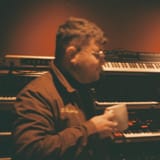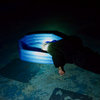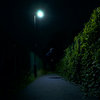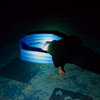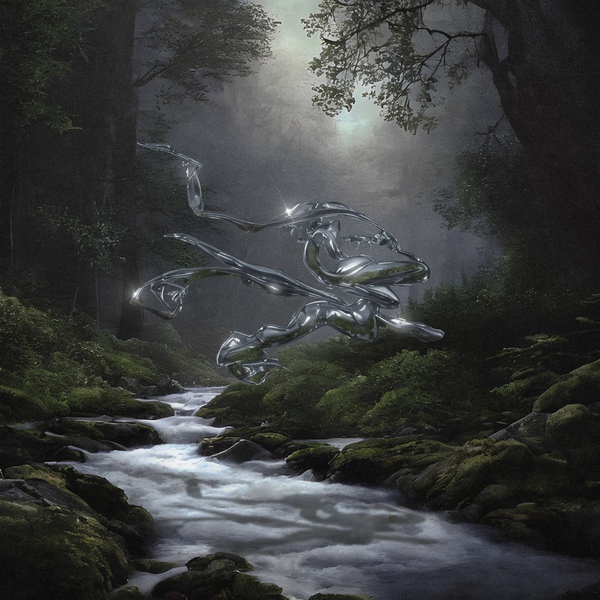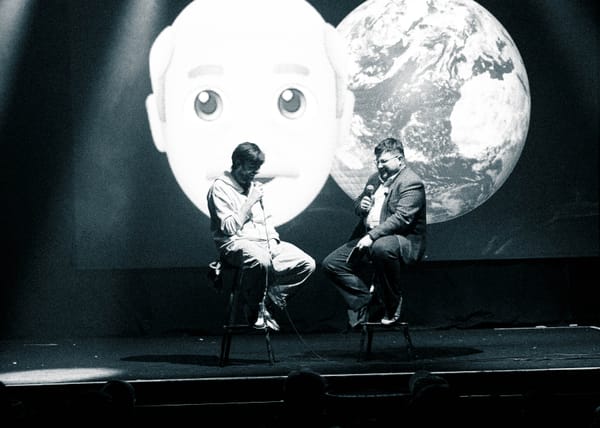a Painful conversation with Alex Gough
talking his debut album, the changing shape of curation, the value of events ranging from Clash at the Quays to Blue Niall's Oisín. "I’m giving it five years: the thing a young person says is their favourite thing will be Irish. Without a doubt, they’ll say their favourite shit is from home."
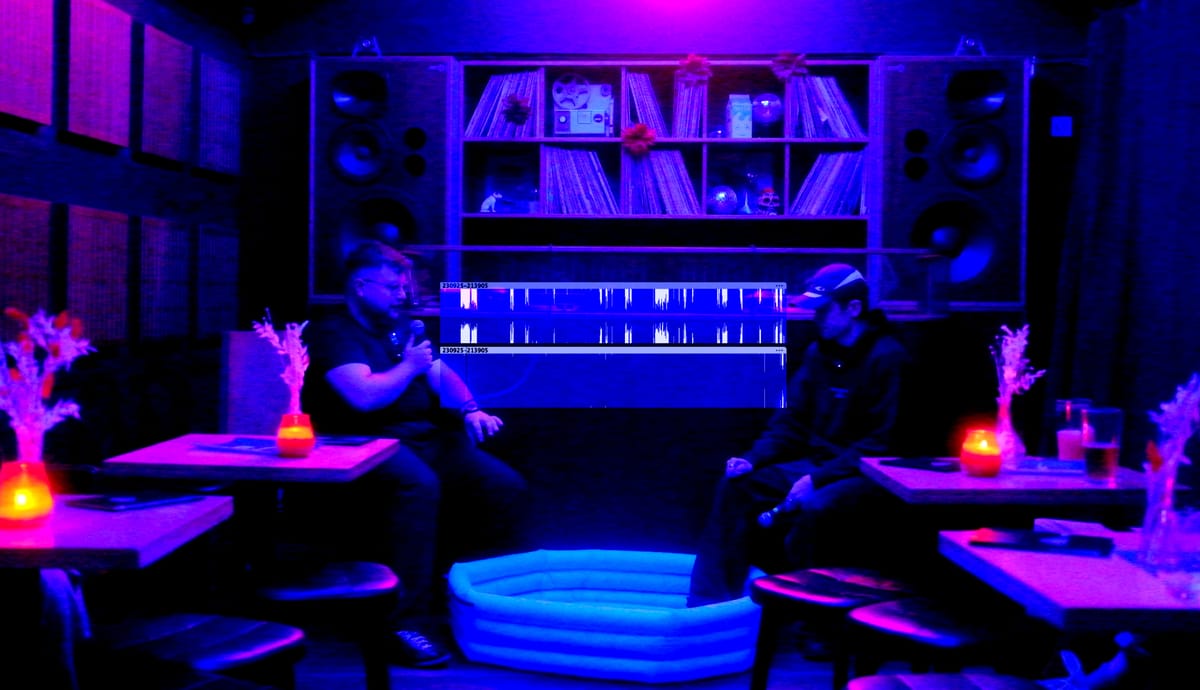
I've spent a lot of this year working with Alex Gough on the release of his debut album, Painful. When I started Fourth Best, I knew I wanted to get Alex on board to describe his particular experience in the music world. One of his remixes was one of the first things my label put out in 2018. I’ve seen it all from impromptu photoshoots in an Airbnb, in studio sesions for music that hasn’t come out yet, me being completely clueless about the music industry trying to help him out over the years. If you’re not familiar - Alex had one of the most exemplary careers in this new generation of Irish music before the pandemic - he was playing shows internationally, lined up for showcase festivals, he had music in Fortnite and a bunch of random American TV shows. I've seen the bizarre heights, I've seen the weird inconsistencies of it all.
As I wrote in a press kit for the new record:
Painful is an artistic rebirth, reflecting Alex's evolving taste and talents; many tracks stray off the path entirely away from hip-hop, leaning into pure indie rock or deep ambient soundscapes - its closest touch-points feel like Bon Iver's 22, A Million and Frank Ocean's Endless, quiet acts of rebellion and experimentation, deeply personal works with unique sonic worlds unlike anything else in their discographies.
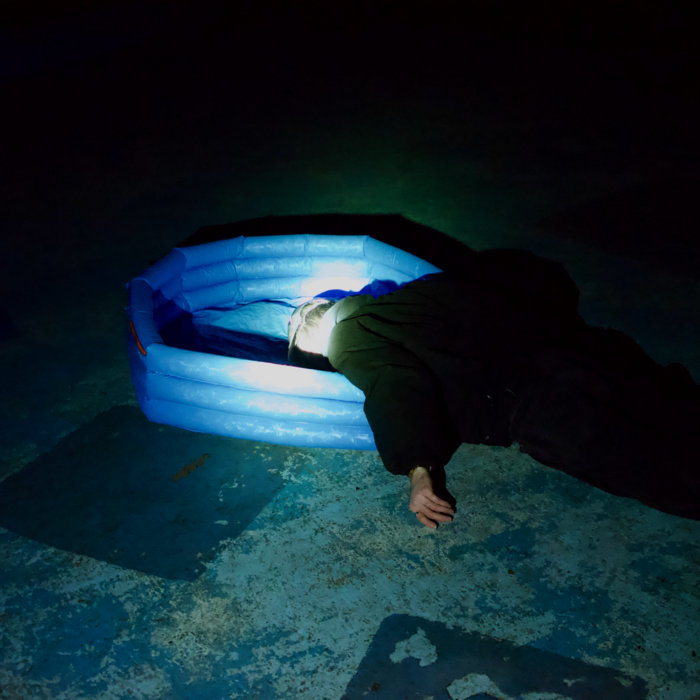
I'm struck by the vulnerability and experimentation on the record, and it's become a go-to for me as the darker nights draw in.

In The Big Romance in late September, we had a live interview at one of the listening parties as he brought the album on tour.
Fourth Best: Alex, when you talk about Painful, you’ve been talking about waiting to get to this point. This is the music you’ve wanted to make, and none of the moments where you were pulling the big numbers were it for you. I also saw a few weeks back you started doing a retrospective on some of your older music where you talked about Afraidofmoney - your first single as a solo artist - you had a similar focus on guitar as lead instrument; very atmospheric, very spacious - how did you fall away from that type of music? How are you coming back to it now?
Afraidofmoney, May 2019
Alex Gough: I’ve asked myself the same questions too many times to count I think, but something I thought after the pandemic and a few situations I had in my life; why did I fall away from doing this myself or doing this how I wanted to? The first tune I put out that had any success was a song called Breakfast, it was and kind of still is my most successful song. I made that tune on the bus home from Longitude in 2017 - the first time I saw Dave, Stormzy, Tyler, all my favourite artists I thought “I can do this” - very cocky, slightly naive. On the bus home I wrote the lyrics to Breakfast over a J Dilla thing.
Looking back on it I probably went with what was getting noticed; I don’t want to discredit any of the music I put out - I’m proud of it all in how I did it and how I made it happen, but I look back on that music and I don’t see myself in it anymore. When I say I’ve been waiting to land at this point, it’s less about the music and more about me. When I listen to this album and the music that’s to come, I see myself, I hear myself, I feel like I’m presenting myself in the way that I am when I’m on my own. It’s more like I’ve evolved to a point of who I am, I’m not discrediting who I had to be to get here.
FB: You’ve been so many things to so many people on this journey - a solo artist, a producer, a tour manager… I feel like I feel your story is one that speaks to how fragile the machinery around new artists is; Fourth Best often talks about how streaming platforms affect the music industry and the types of music we listen to - I see your story in that. As you reach this point of self-assurance, as you feel like you’re at your best as an artist - do you feel you’re more alone at this point?
AG: Entirely. And that’s not to say I don’t have great support. I do. In my own life I have amazing support from friends both old and ones I’ve only just met, I live in London with a great group of people, I have support from my girlfriend; I had a big listening party in London on Sunday. People don’t have to come to these things but [to audience] all of you came and listened. I get immense support from people. There’s a funny kind of phantom of artists right now of this support that has to exist in order for you to be legit. When I put out Breakfast, the industry was so different and that was five, six years ago. On Spotify you’d get on a playlist and then you’re that guy and everyone wants to know about you and everything.
I remember sitting with Matt in the common room of the Cork School of Music when I just put out Afraidofmoney and it got on Spotify’s New Music Friday - I didn’t know anyone who got that. We sat at a table and it went up by a thousand streams every time I refreshed it. My new single got on that same playlist and it didn’t get a hundred streams. The lonliness you can feel in that changing industry is immense. It’s not just Spotify anymore, it’s TikTok. I uploaded a TikTok that was like “This is my debut album that I made over two years, crying to myself in my room, making this very emotional music, blah blah blah all of these things that I have to do to make that music happen” - six likes. You can put so much importance on the music industry but most of the people doing that thing are only doing whatever the standard was. Six years ago it was New Music Friday. Now it’s 10,000 on TikTok. Five years from now it’ll be something else. The more you stick to that, the more you isolate yourself.
FB: Something I’ve been enjoying about your career is that as your music has been getting better, you’ve broken a lot of the rules over what streaming expects. There was a point where you had the team around you and everything was so tightly controlled - it had to be a certain thing in order to succed. Not to say you made your art for virality - the framing of it is something else. Now I know you’re making nothing for streaming. In the run up for Painful you had Uno? - with a two minute ambient B-Side. You’re doing things in that are peerless in a way.
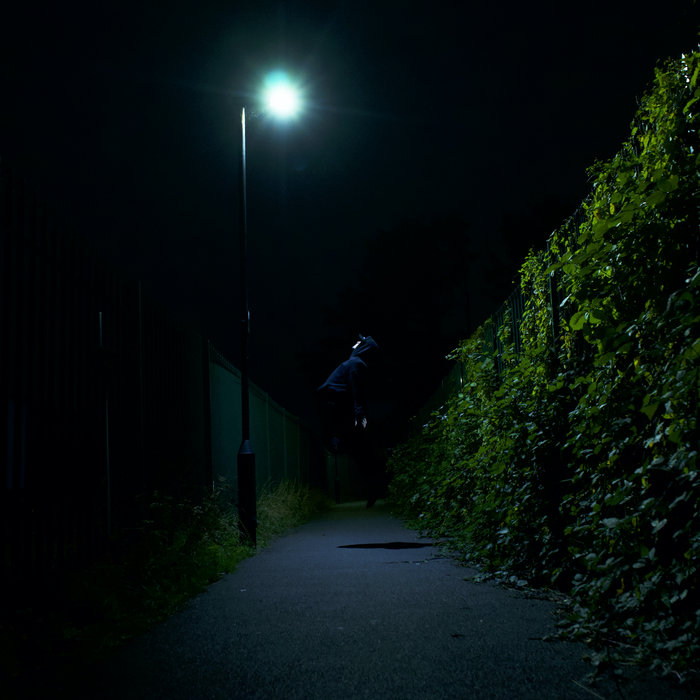
The Bandcamp version of Uno? is the song as it was originally conceived.
I wrote the press release for Painful - and this isn’t bias, I’ve never made a cent doing this and I’m in here for the love of the game —
AG: He’s the goat. Make some noise for Colm.
FB: — I had these points of reference for the album, not just sonically but how their stories are constructed. I get a lot of Endless by Frank Ocean; 22, A Million by Bon Iver… Not just how the album sounds but how you allowed yourself to open a door to whole other sonic properties and keep your songwriting at the core. How did you come upon the controlled chaos of the new stuff?
AG: April 2022, right before I put out an EP called LEMON**** - I was having the worst time. I moved to London. I was happy in the city but I wasn’t where I wanted to be with music, I came out of a pretty crazy situation in the industry, it didn’t go well, the pandemic had just ended. I wrote a song called Lean - which I always wanted to be on my second album. I wrote that song and I bawled for like two hours. It didn’t know what it was but it upset me. It made me feel a certain way. It sounds self-deprecating but it made me feel like I’d never written a good song. Something that stands on its own and not to just do like, XYZ streams. They didn’t mean anything to me. The playlists didn’t mean anything to me, the label deals, the management, the agent, nothing meant anything to me. What meant something to me was that I hadn’t written a good song. If played Breakfast on a guitar for you right now you would all beg for me to shut the fuck up. To me at the time, a good song was something that could exist in many mediums at the same time and still be considered good. When I wrote Lean, I thought “this is what I need to do”.

Every song you heard tonight was written on guitar first, maybe with the exception of September 2. I made that September 2nd last year with my friend Dane - I’m lucky enough to share a studio with him. I remember making that tune and it was like - picking up a guitar and picking up a synth and then one thing after another and suddenly I was just holding a microphone, had my eyes closed and freestyled the whole thing. Done, dusted, I opened my eyes, looked up and thought “what just happened?”
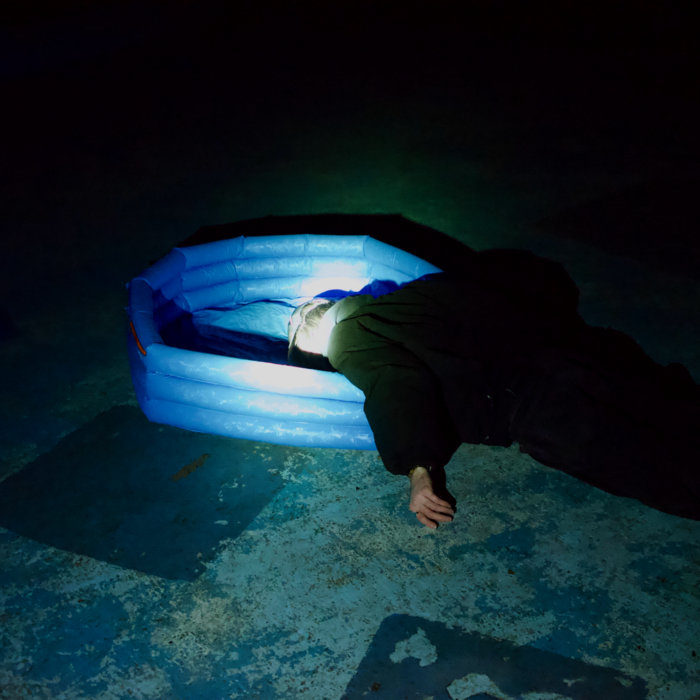
I like that you said “controlled chaos” because that’s what it was - I would start with the guitar and produce around it - how do I take these standard form songs and turn them into something that feels a certain way - I was chasing a feeling for sure.
FB: Lean was the first song you wrote this way?
AG: Absolutely.
FB: I feel like people know you as a drummer or a producer first. Were you all in the DAW before this?
AG: Everything I ever made was because of Logic. I think that’s why the music sounded the way it did - I couldn’t even start a song without Logic. Songs I still like - Breakfast, Pocket Change, Step To Me - they all had to be made in a DAW because I didn’t know how to record drums. Drums was all I knew - I kind of knew to play keys and I played guitar in the way a teenage boy did. It wasn’t until I made Lean that I realised I needed to change my approach to how I wrote songs. I used Logic a bit when I wrote Lean but it was on the piano first, and it helped me to understand that difference.
FB: I’m sitting here next to one of those iconic orange LaCie hard drives with the album name written across the front in marker - I’ve seen so many of those over the years. I have to ask: Did the name Painful come first?
AG: I think I’m going to leak my own plan here. I kind of reverse engineered it a little bit. I made a hundred songs; I worked in a company called Matches Fashion in the Shard right after I made Lean and I was working in the post room on the seventh floor. My manager used to just let me make music. He’d come in and say “let me take the headphones for the sec”, listen for a minute and say “Yeah, OK.”
I made a lot of songs in there. I had an idea - I had enough songs for two albums. I was going to do an EP, an album, my second album. The EP became To Some Degree - the second album was to be called To Love and Be Loved, and the first one was A Painful Experience. I had this idea that it would some day be a box set - it would have this 1975-ass long title To Love and Be Loved / A Painful Experience / To Some Degree. But I hated the name A Painful Experience by itself, that word experience. I was thinking of calling something it like water, something about drowning, but after a while I just trimmed the fat off and went with Painful. It felt stark in a way, something that feels like it would grab attention if you didn’t know me but especially if you did.
FB: Before I got up here you implied you’d tell people what the pool is about.
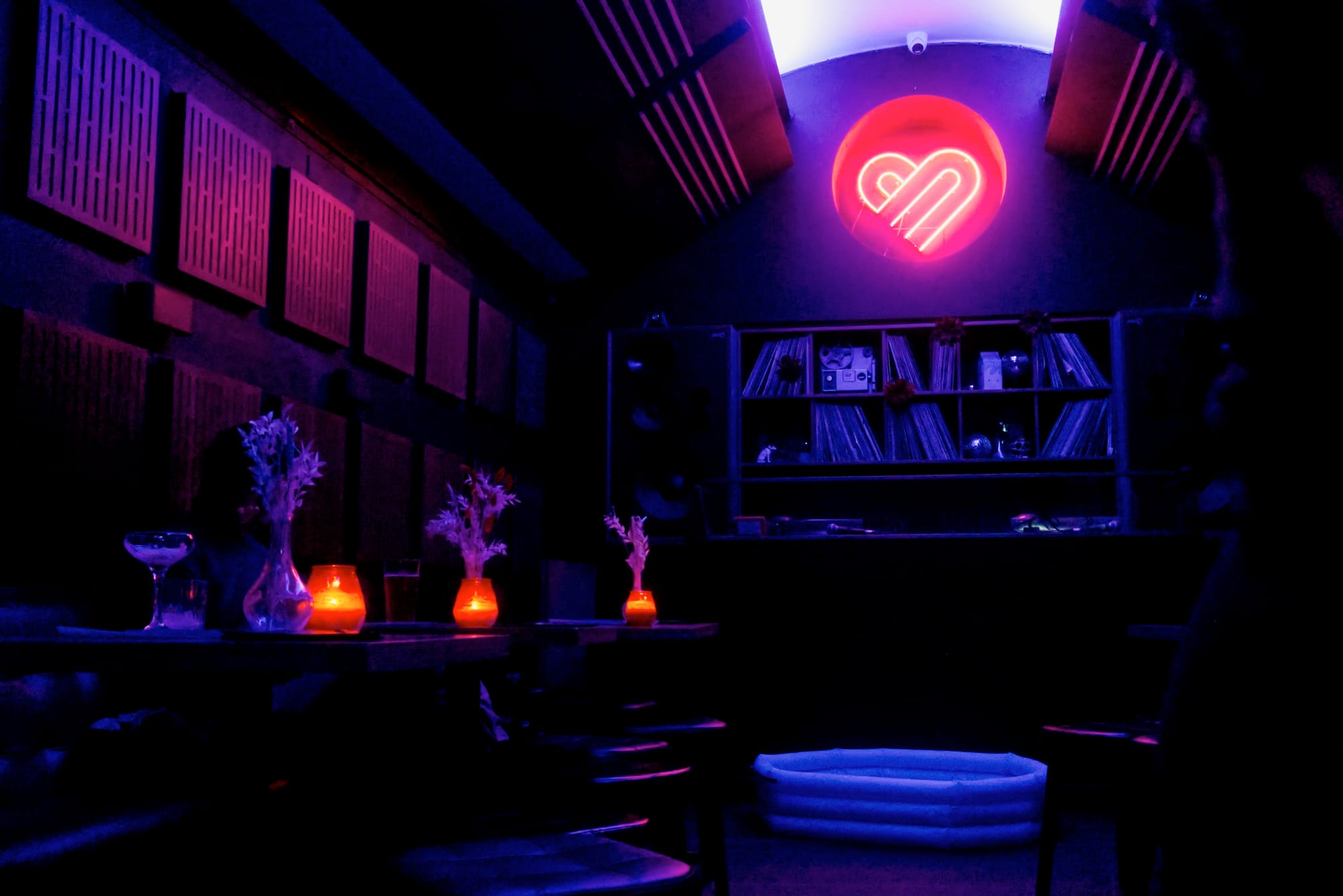
[On the album cover, in press photos leading up to the release, and at this event, Alex has constantly been flanked by the image of a child’s inflatable paddling pool in an intense artificial blue hue. Introducing my interview, he said “You might know what this is about after.”]
AG: Yeah.
FB: What is the pool?
AG: Somebody asked me this in London. I’m probably not going to make a habit of explaining it. I like the idea that someone will listen to the record in a solitary moment, in their own time, and come up with something that it means for them. I intended to do a vinyl ahead of these listening events so people could see it. The cover art is me face down in this exact pool. I like having a symbol for each project - I had the idea of the college photoshoot for To Some Degree. Originally I wanted the cover for this album to be me drowning in a massive body of water - like an Olympic swimming pool - very zoomed out, low-lit, Twilight Zone, Twin Peaks kind of vibe. I didn’t want to pay for that or make it a logistic nightmare, couldn’t be arsed emailing the council about it.
I was obsessed with the idea of drowning on the cover. It’s morbid, but it’s true. I ordered a pool online that was tiny, completely shit, this ended up being the second pool, and I shot this with my brother Jordan.
I wanted the idea that what I was drowning in was my own creation. An inflatable pool - if you don’t inflate it it doesn’t exist. The energy I was putting into these things was going to be the thing that kills me. It’s funny to think of it as an inflatable pool, a child’s pool - but I wanted to reflect that it my innocence and naivete that got me. A child’s pool is scary as fuck if you’re drowning in it. There’s not enough water in it to kill a child and the cover art is a grown man who’s died in it.

I can bring an inflatable pool from London to Dublin on a Ryanair flight. In London I encouraged people to look into it as they listened to the record. This object is serious to me and I love that it feels like it might be stupid to someone else.
FB: I love that you referenced David Lynch there. I got that sense walking in here, seeing the room lit by neon and this almost glowing fluorescent object in there. It was the first time I think I really got it.
AG: David Lynch loved doing ridiculous stuff that had these dark and sinister undertones. It really tied into, as you said, the controlled chaos and the almost creepy textures on it.
FB: You’ve played this album live, right?
AG: Once. We just did the last ever Body & Soul festival [A.Wake].
FB: How does that work for you now? Are you still playing drums?
AG: I play drums at the end of one song, and we still end with Dear SJ. Other than that I’m on guitar, out at the front.
FB: What’s your dream stage for this?
AG: Everywhere. I kind of see it in unconventional spaces. In some sort of warehouse, some kind of church… I mean the dream would be a pool. If they still did It Takes A Village we could do it in Trabolgan and it would be class if we could get past the fact it was in Trabolgan.
I love C2C, I love Primavera - I was at Primavera a few years ago DJing for a friend called Joe. Right next to our stage was the Stone Island stage; Blackhaine and Slauson Malone did it - I met them afterward and it was the coolest shit of my life. It was a warehouse; the craziest lighting, far too much smoke.
FB: I talk a lot about the “post-streaming age” and what we have to do to survive in music when platforms aren’t giving people the space, and in Ireland, the people who are succeeding are the ones that are doing that unconventional work to frame their work.
AG: Karim!
FB: Ahmed, with Love. is the blueprint. I still haven’t posted my review of Clash at the Quays yet but it’s unparalleled what he’s been able to do. Most of the music he played at that show is not out. It’s not promo. It’s purely for the experience.
AG: I’ve been in Snap Studios so many times with Karim, Curtisy, Lil Skag, Kibo, Rory Sweeney… He’s played me a lot of that music. We’ve made a lot of that music. He works in a pharmacy every day and then his work rate is unmatched - he’s doing a full WrestleMania and having Lil Skag fight Kibo in a ring. I’ve been thinking about it a lot. Probably the only reason I’m doing these listening parties at all is because physical things are going to last. I can already see — and I hate doing this prophetic shit, like “there’s going to be a digital renaissance” — but people want to get off their phones. People are so reliant on it. My 4G hasn’t been working for a week and I feel like I’ve lost a limb. Somebody has to double down and people like Karim are doing it. I’m trying to do it - people can come in person and listen to the record and have a real life experience with it.
Artists are the ones that can lead that. People will always need art, music, films. If Christopher Nolan said he’s only going to show his next movie in one location and that’s it, people will go to that. More of that is going to lead the charge.
FB: That’s what Francis Ford Coppola’s original plan was for Megalopolis [editor note: this seems to have been back in the 1980s rather than as a post-digital idea]. He was going to build a cinema in the exact centre of America. People would need to travel to see it.
I want to be serious about this. I had this project. It’s long dead but I will revive it someday. I wanted to reach out to Irish artists who weren’t selling their music on anything physical and fund tape runs. There are so many albums that I consider classics but because they came out in that brief window where streaming was absolutely dominant I can’t put it on my record player. I can’t just drop it in my Walkman. I feel there’s something lost there.
I want to do something in print. Maybe it won’t be Fourth Best, I’d love to encourage more new Irish music writing. I think you’re on to something though. Karim showed us that if you build it, people will come. People who have no interest in wrestling went to see Karim get put through a table!
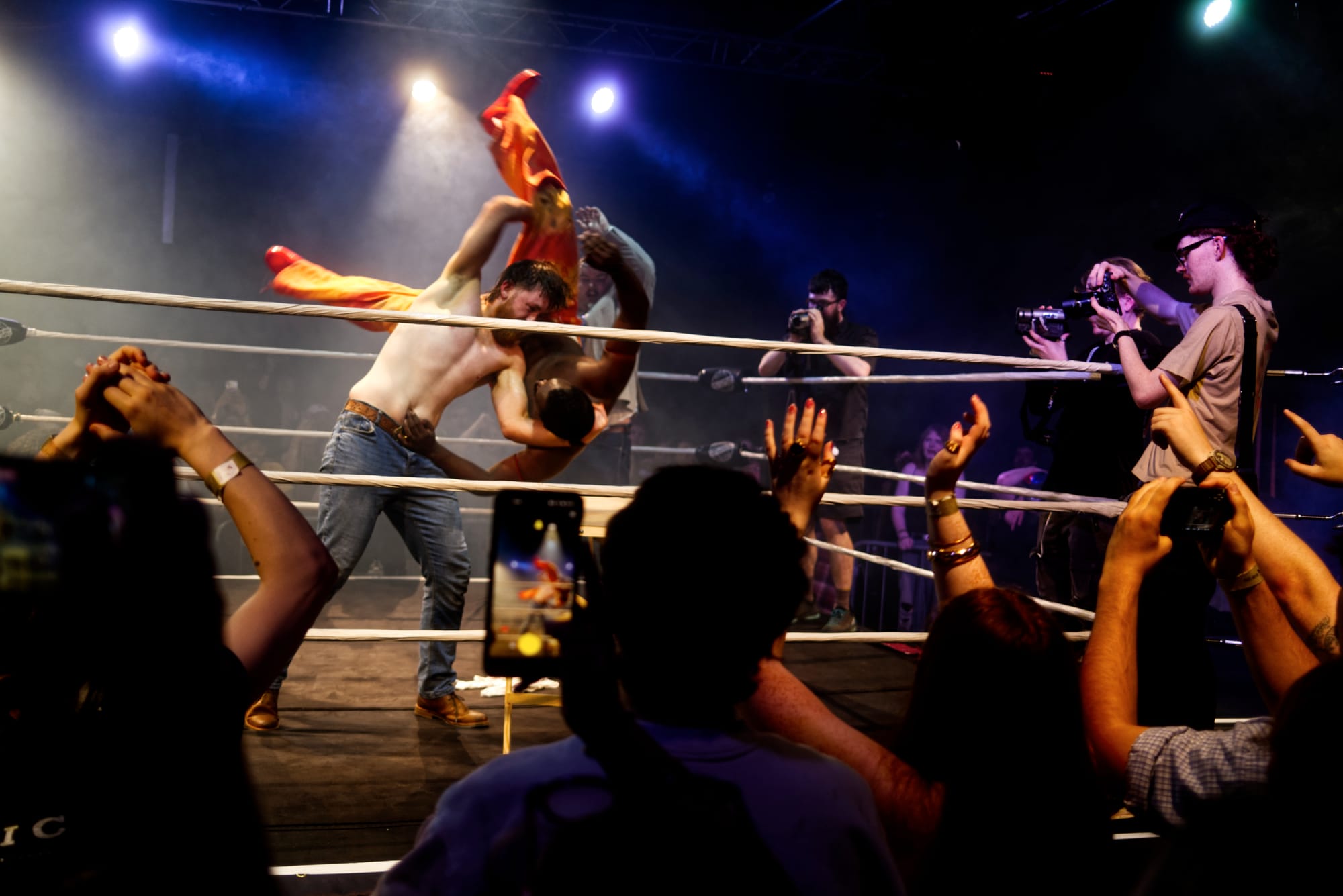
I’m seeing a really weird run of gigs lately. I just saw some sort of half-Irish language hip-hop musical about emigration as an adaptation of Oisín i dTír na nÓg.
AG: Bro. I met someone in London at a Matt Champion gig and he was telling me about [something similar at Fringe]. He was calling it like a drill opera. People are trying stuff! And it’s working!
FB: The truth is a lot of that Oisín show didn’t work for me but I will talk about this forever. He really went and did that shit!
AG: He fucking did it. There are plenty of people out there who aren’t doing it. Kudos to the fella.
FB: Like the day after this I’m seeing Skag, Curtisy, Sloucho, Cluchie Goth for Pellador’s runway show.
AG: I was talking to Skag about it. He’s walking in it! I think Sloucho and Curtisy are too.

FB: I think it’s beautiful that we have these big viral moments of Irish culture. I wouldn’t have seen Skag walking in a runway show. It makes sense and he carries it.
AG: He’s a good looking fella. I was with him and Curtisy shooting a music video - I’m kind of leaking something here but they won’t mind - anyway Skag had the Roy Keane jeans on and I was like “he’s influencing me. I need those jeans. He looks great”. That guy should be a model. Fair play.
FB: In the vein of what Karim and Skag are doing what else are you excited about from Ireland right now?
AG: I love deathtoricky. I made a website for the first time the other day and his music is on the home page. He’s all around the world playing shows and he’s changing what young Irish people want to hear. When I first started doing stuff people were laughing at Irish accents. Deathtoricky and the likes of Curtisy get love in a legitimate way that we haven’t seen with young Irish artists in a while.
Stella and the Dreaming too…
FB: Phenomenal.
Stella and the Dreaming - The First Time. Stella, who we've mentioned in the past, will open for The Cure next year in Dublin. I've heard through the grapevine it was Robert Smith's own choice.
AG: I know her quite well. Paddy [Stella's brother, who makes music as Echo Northstar], as well, he actually worked on one of the songs on Painful. Sloucho, Xavi Contraband, Actualacid, they’ve all been crazy. Goldbug is quite cool, he’s done some stuff with Crash Ensemble I think. Henry Earnest, Maria Somerville…
I’m giving it five years: the thing a young person says is their favourite thing will be Irish. Without a doubt. We saw the Oscars, the Irish film scene and actors are on a global stage, Kneecap etc. - but soon young Irish people, the zeitgeist if you will, they’ll say their favourite shit is from home.
FB: Deathtoricky fascinates me. My favourite song of his is unreleased and he just dropped it on Discord. It’s just an 18mb WAV file, “I’m never dropping this”. And it’s beautiful. It’s got this really cool King Krule sample. I’m thinking “what the fuck are you doing?”
AG: Someone has that on their files on their phone.

FB: It’s me by the way. It’s on my phone. I think it’s interesting that community building can happen in a digital space as well. The Irish underground is getting work done like that. I don’t think takes away from what I was saying about ambitious physical spaces but it’s interesting what the underground is getting done online in a way that feels apart from streaming.
AG: All the Catacombs artists, and the likes of C2, Beddyminaj, etc. They’re not afraid to do what they really want to hear. Beddyminaj is from like Youghal. And he’s doing crazy fried underground music. That’s the reason I think Irish music, art and culture will be cool to Irish people. Irish people are proud of their culture but it’s always been for traditional things. It’s never been for hip-hop. It’s never been for SoundCloud! We have what it takes.
FB: One last question: what’s your advice for other artists and for listeners?
AG: Don’t be afraid to find what you like and like it absolutely. So many times I downplayed what I enjoyed or what I made because I thought people wanted something else. The more you double down to what your taste is, the more you evolve. That’s true for both artists and for listeners. I had a song six years ago that sounded like it could have been on this record but I thought people didn’t want me to make that kind of music, and if I put that out god only knows what kind of music I’d be making now.
FB: Ladies and gentlemen, Alex Gough.
Alex vlogged his Painful listening party tour. Give it a look.

